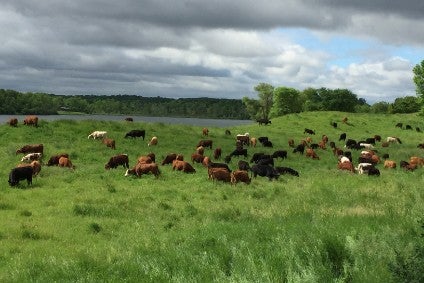
Outdoor lifestyle brand Timberland has partnered with non-profit the Savory Institute as part of ongoing efforts to build a regenerative supply chain for the footwear and apparel industry by connecting early-adopter regenerative ranches with its large-scale tannery partners.
Timberland’s partnership with the Savory Institute – an organisation focused on large-scale regeneration of the world’s grasslands through holistic management – builds on its collaboration with Other Half Processing, which sources hides from Thousand Hills Lifetime Grazed regenerative ranches.
Timberland will co-fund the Institute’s Ecological Outcome Verification (EOV) process on all Thousand Hills Lifetime Grazed ranches. The EOV process measures the tangible regenerative benefits occurring on the land, while also providing valuable data back to farmers to improve their practices.
The partnership will also see Timberland launch a collection of boots made using regenerative leather sourced from the ranches this autumn, with plans to scale the programme significantly over time.
Through its use of agricultural raw materials, the fashion industry and its supply chains are directly linked to the degradation of soil, conversion of natural ecosystems and biodiversity loss. Regenerative agriculture can protect and reverse this environmental degradation.
See Also:
The inclusion of regenerative raw materials is also one of the key principles to building a circular economy in fashion.
How well do you really know your competitors?
Access the most comprehensive Company Profiles on the market, powered by GlobalData. Save hours of research. Gain competitive edge.

Thank you!
Your download email will arrive shortly
Not ready to buy yet? Download a free sample
We are confident about the unique quality of our Company Profiles. However, we want you to make the most beneficial decision for your business, so we offer a free sample that you can download by submitting the below form
By GlobalData“The fashion industry has a significant impact on greenhouse gas emissions, and we believe it’s all of our responsibility to be a part of the solution,” says Colleen Vien, director of sustainability for Timberland. “Regenerative agriculture presents a powerful opportunity to go beyond simply minimising our impact, to actually create value and have a net positive effect for the land and the farmers.”
Ranchers and farmers who use regenerative grazing practices manage their cattle in a way that mimics the natural movement of herd animals. This grazing allows for more rest and re-growth of grasses, leading to better food for livestock and healthier soil, as these grasses pull carbon out of the atmosphere and store it in the ground. These practices also support biodiversity and make the land more productive with greater resilience to both drought and heavy rain.
“The regenerative movement has largely been focused on the food industry to date, but we at Savory Institute believe there is an opportunity to simultaneously synergise with the apparel industry and open up unparalleled successes for the planet,” explains Chris Kerston, chief commercial officer for the Land to Market programme.
“Additionally, cultivating a more complete utilisation of the materials coming off regenerative farms creates mutually beneficial opportunities for the farmer, for the brand, and for the consumer.”
Timberland’s most recent corporate social responsibility update shows that in 2019, 96.7% of leather used in its footwear was produced at tanneries that have a gold or silver rating from the cross-brand Leather Working Group (LWG). LWG certification is awarded to tanneries that demonstrate environmental best practices and performance in all areas of leather production, from chemical, water and waste management to energy use and hide traceability. The figure is up on Timberland’s 96.2% 2018 result.







